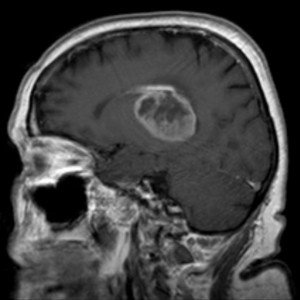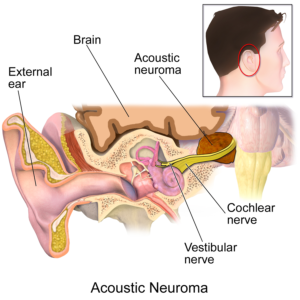
Any brain tumor is bad news, but there are the deadliest and then there are “good” ones – from a relative standpoint, of course.
If you could choose a particular brain tumor to have, there is actually a certain kind that qualifies as being the “best.” Or, to put it another way, the least life-threatening.
Best and Worst Brain Tumors
If you had to have a brain tumor, you certainly wouldn’t want to choose a glioblastoma multiforme—a primary type that’s almost always terminal.
In very rare cases people with GBM live more than five years after diagnosis.
Another hopeless form or brain tumor is metastases from breast cancer or melanoma: secondary malignancies.
In a child, the worst brain tumor to have is the fatal diffuse intrinsic pontine glioma. The odds of young patients living longer than five years after diagnosis are far worse than in adults with GBM.

GBM. Source: Hellerhoff
“The term ‘brain tumor’ is frequently used to describe any growth inside the skull, whether or not it arises from the brain tissue itself,” begins Gene Liu, MD, MMM, and Chief, Division of Otolaryngology, Cedars-Sinai Medical Group.
“As with any other type of tumors, brain tumors can be benign or malignant,” continues Dr. Liu.
“Malignant tumors are the aggressive ones that can grow quickly and can also spread (metastasize) to other body parts. Benign tumors are usually slow growing and never spread.
“Two of the most common benign brain tumors are meningiomas and acoustic neuromas.
“If one were to ever get a ‘brain tumor,’ one of these would be the ‘best’ one to have.
“Both tend to be very slow growing, and may not ever require treatment depending on their size and what symptoms they may be causing.”
If you’ve ever heard of someone who is “living with a brain tumor” but has not had any treatment, and seems to be doing quite well, chances are, the mass is either a meningioma or an acoustic neuroma.
Dr. Liu explains, “Meningiomas arise from the meninges, the layers of tissue that surround the brain and spinal cord.
“Acoustic neuromas are tumors that grow from the eighth cranial nerve which travels from the brainstem to the inner ear.
“Even though they are benign, and even though some do not require any treatment, they CAN lead to symptoms and sometimes do require surgery or radiation.
“Because meningiomas can arise from any part of the meninges, and since the location can vary dramatically, the types of symptoms and the risks of any treatment also varies.”
For example, a meningioma can encroach upon the hypothalamus.
There are many different locations in the brain that a meningioma can arise, and though it’s benign, it can cause crippling permanent effects simply due to its location.
Its encroachment upon the hypothalamus, as an example, will not only damage this gland, but the surgical removal may further damage the gland.
A damaged hypothalamus can totally disrupt the body’s regulation of hunger signals and fat storage metabolism, resulting in chronic morbid obesity and constant and extreme hunger.
“Acoustic neuromas, however, only develop in a small area,” says Dr. Liu. “Because of the location, the most common symptoms are a gradual hearing loss in one ear, ringing in the ear (tinnitus), dizziness, or paralysis of the facial muscles on that side.”

Blausen.com staff/CreativeCommons
If both these brain tumors are never treated, death can result simply because the mass continues growing and hence, pushing, compressing or putting pressure on the brain tissue.
For instance, a neglected acoustic neuroma will likely eventually compress the brainstem and cause cardiac arrest since the brainstem regulates heartbeat.
But neglect is not a realistic scenario (except for primitive societies who have little contact with industrialized medicine).
The symptoms will eventually become impossible to dismiss, and the patient will certainly end up getting diagnosed (which is easy, via an MRI).
Treatment can range from annual MRI surveillance to radiation therapy to mechanical removal.
In treated patients, the worst case scenarios for a meningioma are far worse than in an acoustic neuroma.
The worst case outcome of an acoustic neuroma is significant hearing loss in the affected ear.
Most people would rather live with that than some of the permanent outcomes of a meningioma, which can include cognitive deficits.
Thus, when it comes to the “best” brain tumor that one can ever have, there is a winner.
And it is the acoustic neuroma, which by the way, is actually quite rare.
It is estimated that only one in 1,000 cases of one-ear tinnitus is caused by an acoustic neuroma, which is also known as a vestibular Schwannoma.
 Dr. Liu’s clinical areas of focus cover a broad range including surgery of the head and neck, sinuses and thyroid, and disorders of the ears, salivary glands and vocal cords.
Dr. Liu’s clinical areas of focus cover a broad range including surgery of the head and neck, sinuses and thyroid, and disorders of the ears, salivary glands and vocal cords.
 Lorra Garrick has been covering medical, fitness and cybersecurity topics for many years, having written thousands of articles for print magazines and websites, including as a ghostwriter. She’s also a former ACE-certified personal trainer.
Lorra Garrick has been covering medical, fitness and cybersecurity topics for many years, having written thousands of articles for print magazines and websites, including as a ghostwriter. She’s also a former ACE-certified personal trainer.
.











